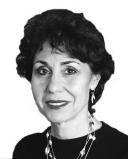
Autism
"Mom, Am I Disabled?"
My autistic daughter's question changed the way we both think about disability.
Posted November 18, 2016 Reviewed by Abigail Fagan

A few years ago my daughter Sam, who is autistic and has known as much since she was eight, came home from school wondering, “Mom, am I disabled?”
Nobody had “said something,” and nothing in particular had occurred at school. But Sam knew she had an aide, an IEP, and a scheduled time in the resource room. She knew that she saw a social worker and a speech therapist in school and another one of each outside of school. She worked with an occupational therapist once a week and met with an English tutor. She knew that autism was the reason for all of these extra people in her life, and she loved every one of them. So when she asked if she was disabled, the question did not arise from a feeling of frustration or self-pity; she was just curious.
“No, you are not disabled! Some things are harder for you than for other people, like figuring out how to play on a playground. Some things are easier for you, like memorizing the Bill of Rights and recognizing anachronistic elements in historically-themed movies. You have challenges and you have strengths. Just like everyone else.”
The intensity of my response, as well as my blood-pressure spike, surprised me. Sam received her diagnosis before she turned three. I know full well that she may never live independently. And yet, when pressed for an answer, I discovered that, no, I do not believe she is disabled.
“Disabled” connotes an inability to do anything meaningful or productive. An elevator is disabled when the cable breaks. A bomb is disabled when a bomb squad defuses it. A pianist whose hand is crushed in an automobile accident becomes disabled as long as his or her sense of identity derives only from playing the piano. My daughter, however, possesses many talents and life skills. She cooks and sews. She cleans the cats’ litter boxes, unloads the dishwasher, and gets herself to school every day. She laughs easily and explores her passions with a creativity that still surprises me sometimes. My daughter has a disability, but she is not disabled.
It’s strange that I feel so passionate about making this distinction, because I generally roll my eyes at person-first rhetoric. I am short (5’1”). I am not a person with short stature. Perhaps the distinction is semantically meaningless, but to me, a disability is a component of one’s personality; it is one of many traits we have. Sam has a disability. In contrast, “disabled” is something we are. Or, as in Sam’s case, are not.
I fear that identifying a person as disabled entails locking that person into a world of very limited expectations.

If Sam were truly disabled, how little would we expect of her? And how little effort, therefore, would we want to expend on encouraging her to grow? Thinking of Sam’s autism as a disability, on the other hand, requires me only to acknowledge that she will never be a successful used-car salesman. My height disability precludes me from playing professional basketball (as does my abysmal hand-eye coordination), but it does not make me disabled. Similarly, Sam’s atypical brain does not consign her to a life of failure and lack of purpose.
None of our children can truly grow up to be anything they want to be. If they could, both of my brothers would be playing major-league baseball, and I would have won the Nobel Peace Prize. We all have limitations. With a child who has special needs, those limits certainly seem more, well, limiting, but my job as a mother is to focus on building my child’s belief in her own agency, not to focus her attention on what she cannot achieve.
The other night I asked Sam, as I periodically do, whether or not she thinks she is disabled. Not only does she not see herself as disabled, but she also does not even believe she has a disability. She says she has a difference. While I cannot say that I have reached her enlightened position—after all, I still receive the calls from school when problems arise, and I still pay the therapy bills—I know that her belief about herself is key to moving her forward into a meaningful, productive life. Disabled? Forget that.

